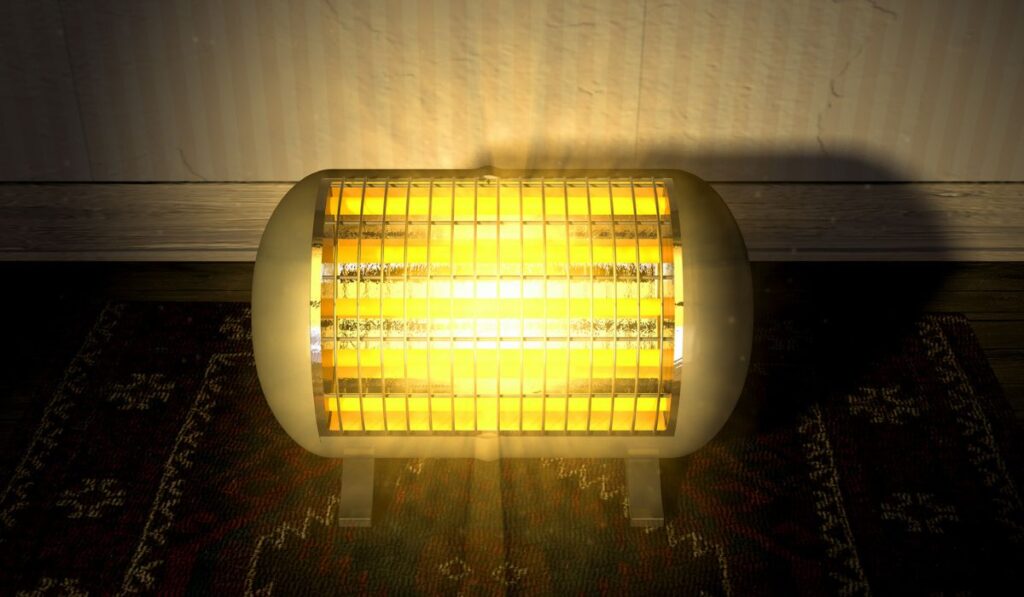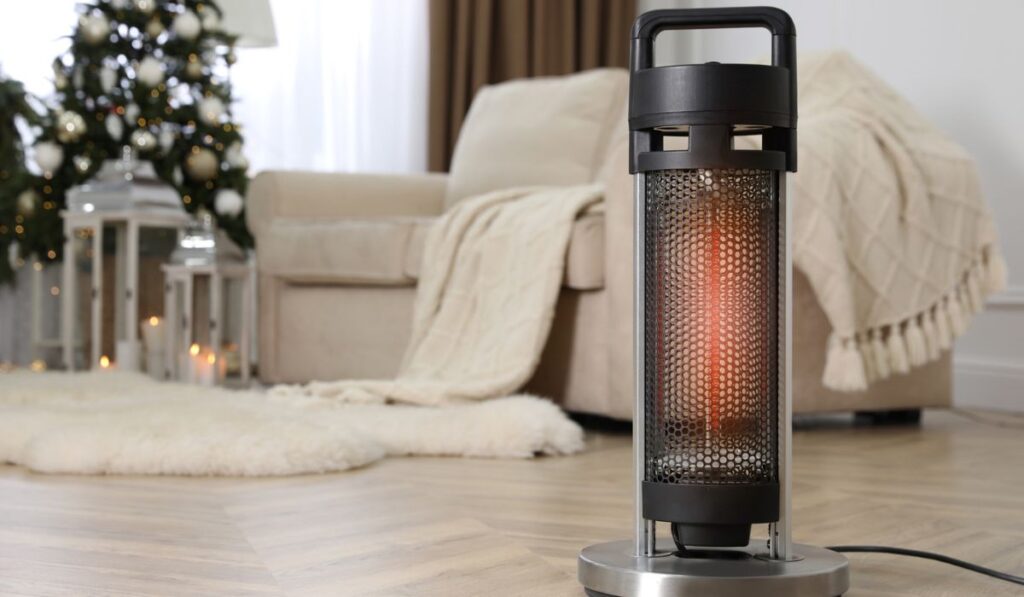Space heaters provide a convenient and cost-effective way to keep any space warm and cozy. However, considering that they are responsible for upwards of 16% of all home fires in the US, the safety risks associated with them are a major concern for many homeowners. One of the most common concerns is whether it is safe to leave a space heater running all night.
Leaving space heaters running all night is a fire hazard. But some modern heaters have safety features like tip-over protection, automatic shut-off, adjustable thermostats, and shut-off timers. These, in addition to safety steps such as installing working smoke detectors, reduce the fire risk.
In this article, we will address many common concerns about using space heaters. We will also highlight the best practices for the safe operation of a space heater and features to look out for when shopping for one. Read on to learn how to stay warm and safe when using your space heater at night.
How Long Can You Safely Run Your Space Heater?

It is only natural to want to keep the heat going for as long as the cold winds blow. However, a space heater’s surface temperature rises when when it runs for a long time. High temperatures can melt the housing that encases the heater and cause a fire.
For this reason, it is essential to have a space heater that is solidly built and made of fireproof materials. Avoid units made of cheap, low-quality plastic that can wear down more quickly and possibly even melt. Aside from the build quality, built-in safety features may also determine how long a space heater can safely run.
Most modern space heaters have several safety features that allow them to run safely for up to 24 hours. However, this does not mean running your heater all day or night is safe. There is no guarantee that these safety features won’t fail.
What are the Dangers of Running Your Space Heater Too Long?
Running your space heater for too long is ill-advised as it exposes you and your household to severe dangers. Some of these dangers include:
Health Issues Caused by Dry Air
Most space heaters typically produce hot, dry air. Breathing this air for long periods can cause damage to your respiratory system leading to ailments such as nosebleeds, sinusitis, bronchitis, and asthma. The dry air may also trigger dehydration causing your skin to crack and eyes to scratch.
The Risk of Fire
Space heaters can be serious fire hazards when allowed to run for too long. Older models are especially vulnerable to overheating or malfunctioning since they do not have many safety features. Safety features may also fail if you run a space heater for too long.
Carbon Monoxide Poisoning
Propane space heaters emit carbon monoxide. Running such a heater for too long exposes you to the risk of carbon monoxide poisoning. Carbon monoxide can cause damage to vital organs, including the brain and heart, and even lead to death.
Children, pregnant women, older people, and people with pre-existing health conditions are especially vulnerable to carbon monoxide poisoning.
Risk of Burns
The exterior of some space heaters heats up as they heat up. Running them for too long can make the surface very hot. This increases the risk of getting burned, especially for children and pets. In addition, one touch of a hot space heater can necessitate a trip to the vet or ER.
Which Types of Space Heaters are Safe to Run Longer?

All space heaters are not made equal. Some pose fewer safety concerns and can be safely run longer than others. These are heaters that remain relatively cool even while in operation.
When there is no risk of overheating, a space heater can run for hours. This doesn’t mean that you should leave them running 24/7. You must still follow the safety guidelines and handle the heater responsibly. Space heaters you can safely run longer include:
Infrared Heaters
These heaters use infrared technology. They emit infrared heat waves that penetrate the body and induce a deep and soothing warmth.
The infrared waves do not heat the heater’s housing or the surrounding air, so there is no risk of overheating. They also don’t reduce oxygen in the space or dry the air making them better for your health than other heaters.
Oil-Filled Heaters
In an oil-filled space heater, a heating element encased in a metal body heats a reservoir of thermal oil. Hot oil rises to the top as the cooler oil moves towards the heating element. The oil movement means that there is no risk of overheating.
Ceramic Heaters
Ceramic heaters have a plastic exterior and heating elements made from ceramic. Convective ceramic heaters use electricity to heat the ceramic plate. A fan disperses the heat from the plate to the room. Since the plastic casing does not get hot, the fire risk is minimal.
Some Safety Tips and Advice for Owning a Space Heater
Owning a space heater does not have to be a risk. However, if you observe some safety tips, you can keep your home warm and cozy without worrying about a disaster. These include:
- Plug your space heater directly into the wall outlet: Extension cords and power strips increase the risk of accidents such as tripping and overheating, which can lead to fires.
- Don’t leave the heater unattended: You need to turn off your space heater if you are leaving the room or falling asleep.
- Install fire and smoke alarms: Accidents happen despite our best efforts to avoid them. Therefore, maintaining working fire and smoke alarms as the first line of defense is advisable.
- Position your heater accordingly: Place your heater in an open space, on an even surface at least three feet away from loose combustible materials such as curtains, furniture, beddings, or papers.
- Use the timer and thermostat settings: setting the temperature and timer saves energy and reduces the risk of overheating, especially when the heater runs for long.
Best Features to Look for When Buying a Space Heater
A top-quality space heater should have safety features that limit the risk of accidents, especially if you intend to leave your heater running all night. Some of the best safety features to look out for when buying a new unit include:
- Tip-over protection: Turns off the heater when it is knocked over. It is imperative if you are running the heater overnight or if you have children or pets in the house.
- Automatic shut-off: Prevents overheating by turning off the heater when it approaches excessive internal temperatures.
- Adjustable thermostat: Makes the heater run only when the temperature falls below the set number.
- Timer: This allows you to set the duration you want your heater to run before going off.
- Safety certifications: The heater has met the safety standards of trusted independent testing organizations like Underwriters Laboratory (UL).
In Summary
Space heater safety is a major concern for many, from homeowners to fire officials. While these portable units are effective at making any space warm and cozy, they have been responsible for fire accidents that have claimed many lives. A significant number of these accidents are a result of leaving the heater running all night.
Chances of the unit overheating, tipping over, or short-circuiting and causing a fire while you are fast asleep are high.
These risks can be mitigated by investing in a modern space heater with a quality build and safety features and following basic safety tips. The type of space heater you use also determines whether you can safely leave it running all night or not.
